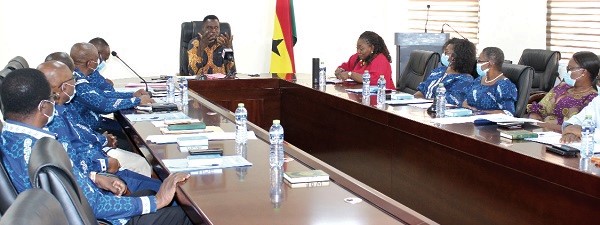
Institute of Human Resource urged to promote industrialisation
The Minister of Education, Dr Yaw Osei Adutwum, has called on the Chartered Institute of Human Resource Management, Ghana (CIHRM) to produce an innovative and quality human resource that will set the country on the path of industrialisation and accelerate its economic development.
That, he said, was important because developing the human mind and improving the human resource capacity of the country was crucial to turning around its fortunes in this current global economic downturn.
Advertisement
Dr Adutwum made the call in Accra last Friday when he inaugurated an 11-member governing board of the CIHRM.
The CIHRM brings together HR practitioners who work in both the public and the private sectors of the Ghanaian economy.
Established in 1978 and registered as a professional body in 1981, the institute operates under the CIHRM, Ghana, Act 1020 of 2020.
Dr Adutwum entreated the CIHRM to partner the government to conduct a thorough research to address the human resource needs of the nation.
He explained that the research, when conducted, should include skills assessment of the sectors of the economy that were in high demand, gender disparities in the production of the required human resource for jobs that were in high demand and generally look at how best to fully tap the raw human resource potential from deprived areas.
He noted that when the CIHRM partnered the government effectively, it would help address gender disparities in careers such as engineering which were in high demand globally.
Toast of industries
“Whereas countries such as Vietnam are producing 100,000 engineers a year, Ghana is producing only about 6,500 engineers a year and so Vietnam has become the toast of most industrialists and that is where all of them will go because we don't have the capacity to satisfy their demands,” the minister said.
At the tertiary level of education, he said, there was a mismatch between producing graduates for jobs that were in high demand and producing graduates to go into areas where there were no jobs for them to do.
He said it was not enough to have gender parity, stressing that ensuring what women or females did at the tertiary level was key.
He said it was for that reason that the government was encouraging more girls to enroll in Science, Technology, Engineering and Mathematics(STEM) education through the provision of facilities at the Bosomtwe and the Kumasi Girls’ Senior High schools, both in the Ashanti Region and Kpone Katamanso in the Greater Accra Region.
“Before the free senior high school policy was introduced, out of every 200 students we had 92 being girls and 108 boys, but now it is 99 girls and 101 boys. Next year we may achieve a 100 per cent gender parity," Dr Adutwum indicated.
Sanity
The President of the CIHRM, Dr Edward Kwapong, called on Parliament and the government to facilitate the operationalisation of a Legislative Instrument to enable the governing board of the CIHRM to bite harder and sanitise the system.
That, he noted, would help address the proliferation of unlicensed human resource training institutions, although the CIHRM is the only institute mandated by law to regulate the practice of human resource practitioners in the country.
“We will sanitise the labour market and weed out these charlatans and make sure that anybody who claims to be practising HR will be screened, registered and licensed to operate as a human resource practitioner,” he stressed.
Governing board, institution
The Director, General Administration of the Ministry of Education, Catherine Agyapomaa Appiah-Pinkrah, gave a background to how the CIHRM came into being.
The other members of the governing board, all seasoned human resource consultants, are Dr Leonard Quarcopome, Vice-
President of the institute; John Arthur Wilson, immediate past President, Dr Anthony Apedzi and Isaac Sackey.
The others are Florence Hutchful, Dorothy Asare, Trudy Osae and Abdul Razak Umar, representing the Ghana Employers Association and the Ministry of Education, respectively.
The rest are Saaka Sayuti of the Ghana Tertiary Education Commission and Dr Ebenezer Ofori Agbettor, Chief Executive Officer of CIHRM.



